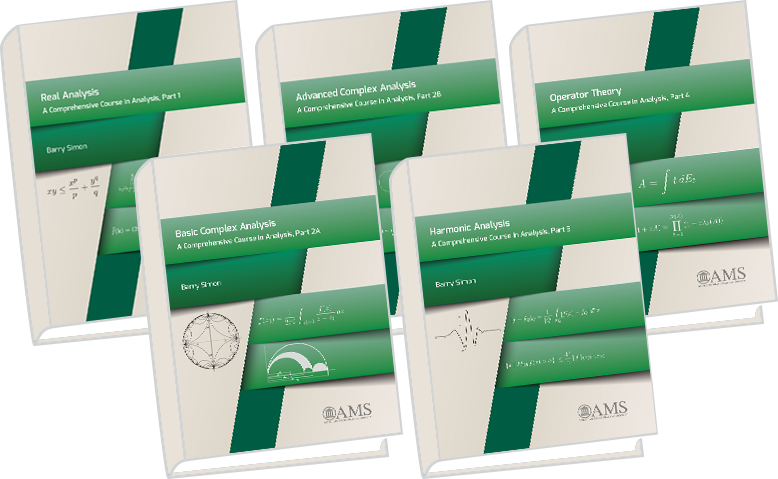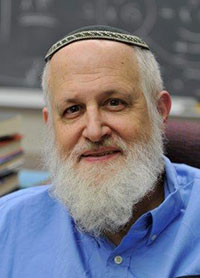
A Comprehensive Course in Analysis by Barry Simon
Supplementary Material
The Ultimate Companion to A Comprehensive Course in Analysis
This PDF contains:
- Preface to the Series
- Tables of Contents and Prefaces (Parts 1, 2A, 2B, 3, and 4)
- Sample Section: Classical Fourier Series (Section 3.5 from Part 1)
- Subject Index
- Author Index
- Combined Index of Capsule Biographies
 |
About the AuthorBarry Simon is currently an IBM Professor of Mathematics and Theoretical Physics at the California Institute of Technology. He graduated from Princeton University with his Ph.D in Physics. In 2012 Simon won the International Association of Mathematical Physics’ Poincaré Prize for outstanding contributions to mathematical physics. He has authored more than 400 publications on mathematics and physics.
Contact information: |
|
|
About the the Set
This is a graduate analysis text, of approximately 3,000 pages, with lots of additional bonus material. Included are hundreds of problems and copious notes that extend the text and provide historical background. Efforts have been made to find simple and elegant proofs and to keeping the writing style clear. |
Part 1: Real Analysis - 978-1-4704-1099-5
Point Set Topology, Banach and Hilbert Space, Measure Theory, Fourier Series and Transforms, Distribution Theory, Locally Convex Spaces, Basics of Probability Theory, Hausdorff Measure and Dimension.
Selected topics include Bernstein Polynomials, Pointwise Converge of Fourier Series, Lp spaces, Brownian Motion, Measures on Polish Spaces, Haar Measure, Convexity, Alexandroff–Hausdorff and Banach–Mazur theorems, Knaster–Kuratowski Fan, Krein–Milman Theorem, moment problems, fixed point theorems including existence of invariant subspaces for compact operators, Hermite expansions, Nyquist–Shannon sampling theorem, Riesz products, fundamental solutions of classical linear PDEs and the Malgrange–Ehrenpreis theorem, law of large numbers, central limit theorem, law of the iterated logarithm, Poisson processes, Markov chains, Carathéodory construction, inductive limits and ordinary distributions.
Part 2a: Basic Complex Analysis - 978-1-4704-1100-8
Cauchy Integral Theorem, Consequences of the Cauchy Integral Theorem (including holomorphic iff analytic, Local Behavior, Phragmén–Lindelöf, Reflection Principle, Calculation of Integrals), Montel, Vitali, and Hurwitz’s Theorems, Fractional Linear Transformations, Conformal Maps, Zeros and Product Formulae, Elliptic Functions, Global Analytic Functions, and Picard’s Theorem.
Selected topics include the Goursat Argument, Ultimate and Ultra Cauchy Integral Formulas, Runge’s Theorem, complex interpolation, Marty’s Theorem, continued fraction analysis of real numbers, Riemann mapping theorem, Uniformization theorem (modulo results from Part 3), Mittag–Leffler and Weirstrass product theorems, finite order and Hadamard product formula, Gamma function, Euler–Maclaurin Series and Stirling’s formula to all orders, Jensen’s formula and Blaschke products, Weierstrass and Jacobi elliptic functions, Jacobi theta functions, Paley–Wiener theorems, Hartog’s phenomenon, and Poincaré’s theorem that in higher complex dimensions, the ball and polydisk are not conformally equivalent.
Part 2b: Advanced Complex Analysis - 978-1-4704-1101-5
Conformal metric methods, topics in analytic number theory, Fuchsian ODEs and associated special functions, asymptotic methods, univalent functions, and Nevanlinna theory.
Selected topics include the Poincaré metric, Ahlfors–Robinson proof of Picard’s theorem, Bergmann kernel, Painlevé’s conformal mapping theorem, Jacobi 2- and 4-squares theorems, Dirichlet series, Dirichlet’s prime progression theorem, zeta function, prime number theorem, hypergeometric, Bessel and Airy functions, Hankel and Sommerfeld contours, Laplace’s method, stationary phase, steepest descent, WKB, Koebe function, Loewner evolution and introduction to SLE, and Nevanlinna’s First and Second Main theorems.
Part 3: Harmonic Analysis - 978-1-4704-1102-2
Maximal functions and pointwise limits, harmonic functions and potential theory, phase space analysis, Hp spaces, and more inequalities.
Selected topics include the Hardy–Littlewood maximal function, von Neumann and Birkhoff ergodic theorems, Weyl equidistribution, ergodicity of the Gauss (continued fraction) map, ergodicity of geodesic flow on certain Riemann surfaces, Kingman subadditive ergodic theorem, Ruelle–Oseledec theorem, martingale convergence theorem, subharmonic functions, Perron’s method, spherical harmonics, Frostman’s theorem, Kellogg–Evans theorem, potential theory on Riemann surfaces, pseudo-differential operators, coherent states, wavelets, BMO, real interpolation and Marcinkiewicz theorem, Hardy–Littlewood–Sobolev inequalities, Sobolev spaces, Calderón–Zygmund method, Calderón–Vaillancourt estimates, Hypercontractive and Log–Sobolev estimates, Lieb Thirring and CLR bounds, and the Tomas–Stein theorem.
Part 4: Operator Theory - 978-1-4704-1103-9
Eigenvalue Perturbation Theory, Operator Basics, Compact Operators, Orthogonal Polynomials, Spectral Theory, Banach Algebras, and Unbounded Self-Adjoint Operators.
Selected topics include analytic functional calculus, polar decomposition, Hilbert–Schmidt and Riesz–Schauder theorems, Ringrose structure theorems, trace ideals, trace and determinant, Lidskii’s theorem, index theory for Fredholm operators, OPRL, OPUC, Bochner–Brenke theorem, Chebyshev polynomials, spectral measures, spectral multiplicity theory, trace class perturbations and Krein spectral shift, Gel’fand transform, Gel’fand–Naimark theorems, almost periodic functions, Gel’fand–Raikov and Peter–Weyl theorems, Fourier analysis on LCA groups, Wiener and Ingham tauberian theorems and the prime number theorem, Spectral and Stone’s theorem for unbounded self–adjoint operators, von Neumann theory of self–adjoint extensions, quadratic forms, Birman–Krein–Vershik theory of self–adjoint extensions, Kato’s inequality, Beurling–Deny theorems, moment problems, and the Birman–Schwinger principle.


